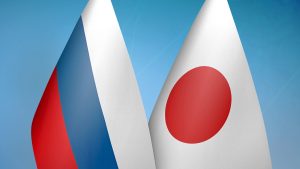Last week, Japan’s ban on exports of chemical weapons-related goods to Russia came into effect, infuriating Moscow. The new sanctions came after Russia declared the unilateral annexation of four regions of Ukraine.
Over the last three months, Japan-Russia relations have reached a new stage of acrimony as Japan works to increase pressure on Russia in line with other G-7 allies.
Before the Russian invasion of Ukraine, Japan-Russia relations were, at best, a work in progress. But the Japanese government’s continued tough diplomatic response to Russia is attracting further hostility from Moscow. As Russian Foreign Ministry Spokeswoman Maria Zakarova said, “Japan’s illegal sanctions against Russia would not be left without an appropriate response.”
Japan and Russia are also reeling from tit-for-tat diplomatic expulsions. This month the Japanese government ordered the Russian consul in northern Japan to leave in retaliation for the expulsion of the Japanese consul in Vladivostok over allegations of espionage. In a rare move, the Japanese diplomat was detained and allegedly blindfolded by Russia’s Federal Security Service. He was later designated as persona non grata (PNG), which strips diplomats of diplomatic immunity, leaving him vulnerable to arrest. PNG is considered one of the most serious sanctions against a diplomat.
Japan’s Foreign Minister Hayashi Yoshimasa issued a protest over Russia’s expulsion of the consul, calling it a “clear violation of the Vienna Convention on Consular Relations,” as well as of a consular treaty between Japan and Russia.
Russia has tended to reserve criticism for the West’s support for Ukraine’s counteroffensive. But Japan has increasingly become a target of Russian fury. On Wednesday, the United States and Japan ordered the self-destruction of a failed rocket launched in northern Japan. Russia condemned the joint drills by issuing a protest. In a statement, the Russian Ministry of Foreign Affairs ordered Japan to stop joint military drills with the U.S., calling it a threat to Russia’s security. They warned the Japanese side they will take appropriate measures to prevent military threats against Russia.
Russian Ambassador to Japan Mikhail Galuzin also accused the Kishida administration of “maintaining a destructive policy towards Russia that is further worsening bilateral relations.”
In the business realm, Japanese automakers Mazda, Toyota, and Nissan have announced their withdrawal from Russia due to the escalating conflict in Ukraine. Honda and Subaru have also halted exports. Nissan plans to sell its operations to a local partner and stop manufacturing SUVs in Russia at a loss of $680 million. Galuzin criticized Japan’s latest sanctions and mocked the losses Japanese automakers would incur from the withdrawal as “going against Japan’s long-term national interest.”
Earlier this year, Russia unilaterally announced the suspension of dialogue over a Japan-Russia territorial row involving four Russian-held islands known as the Northern Territories in Japan or the Kuril Islands in Russia. Russia also put Japan on a list of “unfriendly countries” in March, which was followed by Russia banning the entry of some 400 Japanese lawmakers in mid-July in reaction to Japan joining G-7 sanctions.
































